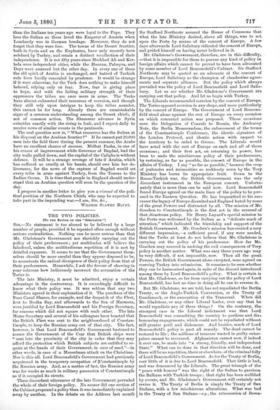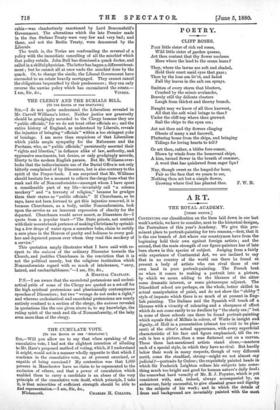THE TWO POLICIES.
(To THE EDITOR OP THE "Brscreaos."1 SIR,—No statement is too absurd to be believed by a large number of people, provided it be repeated often enough without serious contradiction. Nothing can be more untrue than that Mr. Gladstone's Government are slavishly carrying out the policy of their predecessors ; yet multitudes will believe the falsehood, unless the multitudinous repetition of it is met by detailed exposure. It seems to me that the Government them- selves should be more careful than they appear disposed to be, to accentuate the radical divergence of their policy from that of their predecessors. Meanwhile, I ask the favour of showing in your columns how ludicrously incorrect the accusation of the Tories is.
The late Ministry, it must be admitted, enjoy a certain advantage in the controversy. It is exceedingly difficult to know what their policy was. It was seldom that any two Ministers agreed in their explanation of it. The purchase of the Suez Canal Shares, for example, and the despatch of the Fleet, first to Besika Bay, and afterwards to the Sea of Marmora, were justified by Lord Beaconsfield and his Foreign Secretary, for reasons which did not square with each other. The late Home Secretary and several of his colleagues have boasted that the British Fleet was sent to the neighbourhood of Constan- tinople, to keep the Russian army out of that city. The fact, however, is that Lord Beaconsfield's Government hastened to assure the Government of the Czar that British ships were " sent into the proximity of the city in order that they may afford the protection which British subjects are entitled to re- 'lire at the hands of their Government, in case of need,"—in other words, in case of a Mussulman attack on the Christians. Nor is this all. Lord Beaconsfield's Government had previously acquiesced in the temporary occupation of [Constantinople by the Russian army. And, as a matter of fact, the Russian army was for weeks as much in military possession of Constantinople as if it occupied its streets.
These discordant utterances of the late Government pervaded the whole of their foreign policy. No sooner did one section of the Cabinet ptopound a policy than it was immediately explained away by another. In the debate on the Address last month
Sir Stafford Northcote assured the House of Commons that what the late Ministry desired, above all things, was to act upon the Porte by means of the concert of Europe. A few days afterwards Lord Salisbury ridiculed the concert of Europe„ and prided himself on having never believed in it.
Mr. Gladstone's Government, therefore, are in this difficulty, • —that it is impossible for them to pursue any kind of policy in. foreign affairs which cannot be proved to have been advocated by some member of Lord Beaconsfield's Cabinet. Sir Stafford Northcote may be quoted as an advocate of the concert of Europe, Lord Salisbury as the champion of clandestine agree- ments and separate alliances. But the policy which always prevailed was the policy of Lord Beaconsfield and Lord Salis- bury. Let us see whether Mr. Gladstone's Government are carrying out that policy. And let us begin with Turkey.
The Liberals recommended coercion by the concert of Europe. The Tories opposed coercion in any shape, and more particularly by the concert of Europe. The Government of Lord Beacons- field stood alone against the rest of Europe on every occasion on which concerted action was proposed. Those occasions were the Delegation of Consuls to Bosnia, the Andrassy Note, the Berlin Memorandum, the enforcement of the terms of the Constantinople Conference, the identic signature of the London Protocol, and identic action with respect to the territory to be ceded to Greece. The Liberals would have acted with the rest of Europe on each and all of these occasions ; and their first act, on returning to power, has been to undo the mischievous policy of their predecessors, by restoring, as far as possible, the concert of Europe in the affairs of Turkey. I say "as far as possible," because the crop of jealousies and animosities so recklessly sown by the Tory Ministry has borne its appropriate fruit. Down to the Russo-Turkish war, the Biitish Government was the only discordant instrument in the European concert. Unfortu- nately that is more than can be said now. Lord Beaconsfield found Europe agreed on the main lines of the policy to be pur- sued in the Eastern Question. He has bequeathed to his suc- cessor the legacy of Europe disunited and England hated by some of the great Powers and distrusted by all. The mission of Mr. Goschen to Constantinople is the first act in the reversal of that disastrous policy. Sir Henry Layard's special mission to the Porte was welcomed by the Sultan as a "delicate mark of attention," which indicated the friendship and support of the British Government. Mr. Goschen's mission has created a very different impression,—a sufficient proof, if any were needed, that the Turks at least do not believe that Mr. Gladstone is carrying out the policy of his predecessor. How far Mr. Goschen may succeed in undoing the evil consequences of Tory policy is another matter. What was easy three years ago may be very difficult, if not impossible, now. Then all the great Powers, the British Government alone excepted, were agreed on coercing Turkey into submission. It remains to be seen whether they can be harmonised again, in spite of the discord introduced among them by Lord Beaconsfield's policy. What is certain is that Mr. Gladstone, so far from carrying out the policy of Lord Beaconsfield, has lost no time in doing all he can to reverse it.
But Mr. Gladstone, we are told, has not repudiated the Berlin Treaty, or the Anglo-Turkish Convention, or the Treaty of Gundamack, or the annexation of the Transvaal. When did Mr. Gladstone, or any other Liberal leader, ever say that he would repudiate any of these things ? On the contrary, the strongest case in the Liberal indictment was that Lord. Beaconsfield was committing the country to perilous and dis- honouring engagements, which could not be repudiated without still greater peril and dishonour. And besides, much of Lord Beaconsfield's policy is past all remedy. The dead cannot be restored to life ; the millions of treasure wasted in guilty enter- prises cannot be recovered. Afghanistan cannot now, if indeed it ever can, be made into "a strong, friendly, and independent State." What can be done in that direction will be done, and there will be no repetition, there or elsewhere, of the criminal folly of Lord Beaconsfield's Government. As for the Treaty of Berlin, very little of it is due to Lord Beaconsfield. That little is bad, and was denounced by the Liberals. The great triumph of the "peace with honour" was the right of the Sultan to garrison the Balkans with Turkish troops ; that right has been nullified by events, and Mr. Gladstone's Government will certainly not revive it. The Treaty of Berlin is simply the Treaty of San Stefano, with a few mischievous alterations. What was bad in -the Treaty of San Stefano—e.g., the retrocession of Besse- rabia—was clandestinely sanctioned by Lord Beaconsfield's Government. The alterations which the late Premier made in the San Stefano Treaty were very few and very bad; and these, and not the Berlin Treaty, were denounced by the Liberals.
The truth is, the Tories are confounding the reversal of a policy with the immediate cancelling of all the mischief which that policy entails. John Bull has dismissed a quack doctor, and called in a skilful physician. The latter has begun a differenttreat- ment ; but he cannot all at once undo the mischief done by the quack. Or, to change the simile, the Liberal Government have succeeded to an estate heavily mortgaged. They cannot cancel the obligations bequeathed by their predecessors ; they can only reverse the unwise policy which has encumbered the estate.—



































 Previous page
Previous page